Brahma is one of the most important deities in Hindu mythology. As the creator of the universe, he holds a special place in the Hindu pantheon and is revered by millions of people around the world. Although Brahma god is often overshadowed by other gods such as Vishnu and Shiva, his significance in Hindu mythology is still immense.
Table of Contents
Who is Brahma: The Origin and Meaning of Brahma
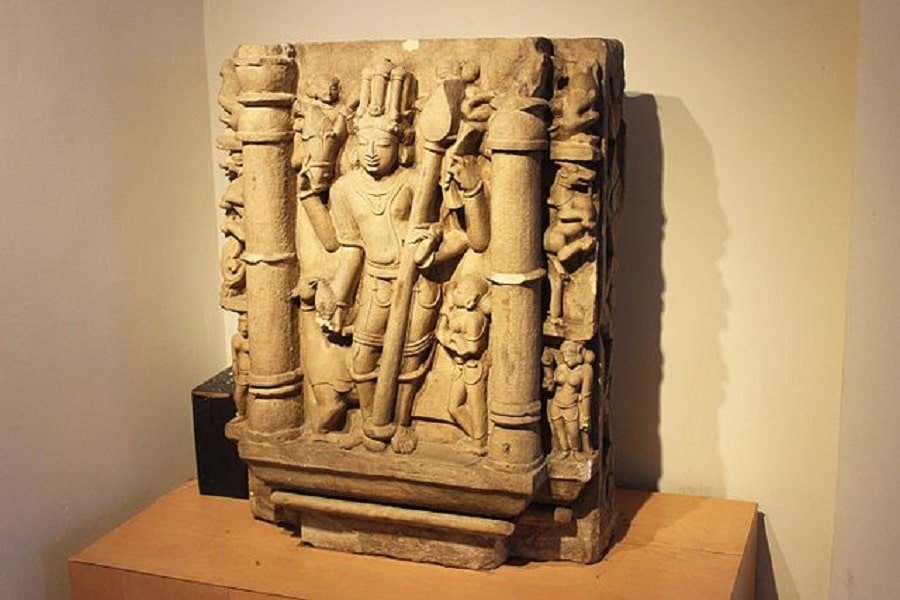
Brahma is one of the three major deities in Hinduism, along with Vishnu and Shiva. He is known as the creator god, responsible for the creation of the universe and all living beings.
Brahma’s Creation Myth
According to Hindu mythology, Brahma emerged from the cosmic egg (Hiranyagarbha) as a golden lotus flower. He then created the universe and all living beings within it. This myth illustrates Brahma’s power and importance as the creator of all things.
In the myth, Hindu god Brahma is often depicted with four faces, each facing a different direction. This represents his ability to see and control all aspects of creation, from every corner of the universe. Brahma is also often shown holding a book or a lotus flower, symbolizing his role as the source of knowledge and enlightenment.
The Etymology of the Name Brahma
The name “Brahma” is derived from the Sanskrit word “brahman,” which means “the ultimate reality” or “the divine consciousness.” This name reflects Brahma’s role as the creator of the universe and all living beings, and his connection to the ultimate reality of the universe.
In Hindu philosophy, Brahma is often associated with the concept of Brahman, which represents the ultimate reality of the universe. Brahman is often described as an all-pervading, eternal, and infinite consciousness that underlies all of existence. Brahma’s name reflects his connection to this ultimate reality and his role as the creator of the universe.
Brahma’s Role in Hindu Worship and Rituals
Brahma, the creator god of Hinduism, plays an important role in Hindu worship and rituals. and is revered and celebrated in Hinduism through festivals, prayers, and rituals dedicated to him.
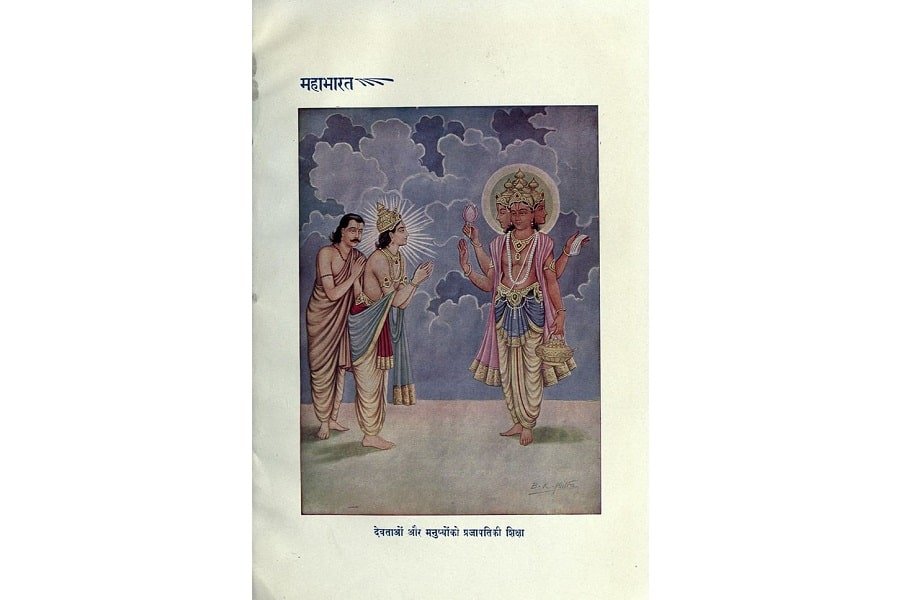
Brahma’s Festivals
Brahma is not as widely celebrated as other Hindu deities, but there are still several festivals dedicated to him. One of the most prominent festivals is Brahmotsavam, which is celebrated in the southern Indian state of Andhra Pradesh. This festival lasts for nine days and is dedicated to Lord Brahma’s avatar, Lord Venkateswara.
Another festival that celebrates Brahma is the Pushkar Fair, held annually in the town of Pushkar in Rajasthan. This festival attracts thousands of pilgrims from across India who come to take a dip in the sacred Pushkar Lake, which is said to have been created by Brahma.
Brahma’s Prayers and Mantras
In Hinduism, prayers and mantras are an important part of worship. Devotees of Brahma often recite the Brahma Gayatri mantra, which is a powerful prayer dedicated to Lord Brahma. The mantra is as follows: “Om Vedatmanaya Vidmahe Hiranyagarbhaya Dhimahi Tanno Brahma Prachodayat.” This mantra is believed to invoke the power of Brahma and bring wisdom and knowledge to the reciter.
While there are no temples dedicated solely to Brahma in India, there are several temples that feature images of Brahma alongside other deities. One such temple is the Brahma Temple in Pushkar, Rajasthan, which is one of the few temples in the world that is dedicated to Lord Brahma. The temple is believed to have been built in the 14th century and features a red spire and a marble floor. The temple also houses a silver turtle, which is said to be the vehicle of Lord Brahma.
Overall, Brahma may not be as widely celebrated as other Hindu deities, but his role as the creator of the universe and the source of knowledge and enlightenment makes him an important figure in Hindu mythology and worship.
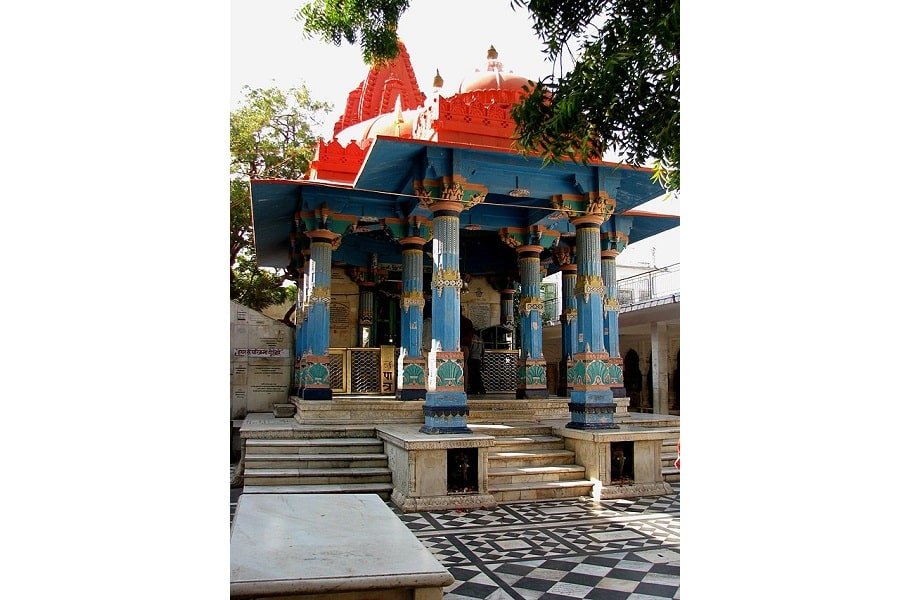
The Significance of Brahma God in Hindu Philosophy
Brahma, the creator god of Hinduism, is not only an important deity in Hindu mythology and worship but also plays a significant role in Hindu philosophy.
In Hindu philosophy, the universe is seen as a manifestation of Brahman, and all living beings are seen as expressions of divine consciousness.
Brahma represents the creative force that brings these expressions of the divine into existence. Through his creation, he provides a means for humans and other living beings to experience the ultimate reality of the universe.
The philosophical significance of Brahma’s role as the creator also underscores the importance of balance and harmony in the universe. Brahma is often depicted as working in tandem with Vishnu and Shiva, the gods responsible for the preservation and destruction of the universe, respectively. Together, these three deities represent the cyclical nature of existence and the importance of balance and harmony in maintaining the order of the universe.
Brahma’s Role in Creation
According to Hindu scriptures, Brahma created the universe through his divine power and knowledge. This concept of creation is known as the Brahma-vivarta or the illusion of Brahma.
Brahma’s role in creation is closely linked to the Hindu concept of the three gunas or qualities of nature – sattva, rajas, and tamas. It is believed that Brahma created the universe by combining these three gunas in varying proportions.
Brahma and the Concept of Existence
In Hindu philosophy, Brahma is also closely associated with the concept of existence. According to Hindu scriptures, existence is divided into two aspects – the unmanifested or avyakta and the manifested or vyakta. Brahma is seen as the cause of both these aspects of existence.
The unmanifested aspect of existence is represented by the seed sound of the universe, known as AUM or Om. Brahma is believed to have created this sound through his divine power and knowledge. The manifested aspect of existence, on the other hand, is the physical world that we experience through our senses.
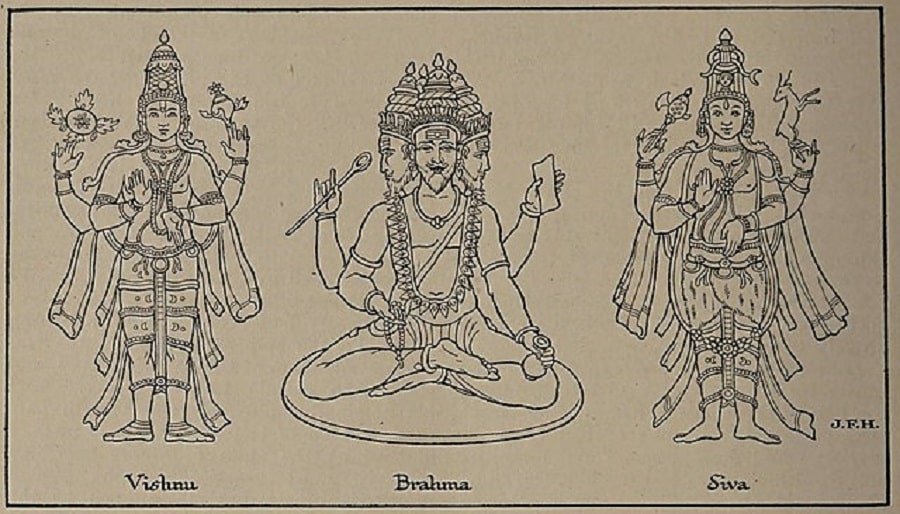
Brahma and the Pursuit of Knowledge
In Hindu philosophy, Brahma is also associated with the pursuit of knowledge and enlightenment. Brahma is believed to be the source of all knowledge and wisdom, and his devotees often seek his blessings to gain them.
The pursuit of knowledge is an important aspect of Hindu philosophy, and it is believed that knowledge can lead to liberation or moksha from the cycle of birth and death. Brahma’s association with knowledge and enlightenment makes him an important figure in the pursuit of spiritual liberation in Hinduism.
Overall, Brahma’s role in creation, existence, and the pursuit of knowledge makes him an important deity in Hindu philosophy. His association with these concepts underscores the importance of spirituality and knowledge in Hinduism and highlights the deep connections between Hindu mythology, worship, and philosophy.
Brahma in Contemporary Hinduism
Brahma, the creator god of Hinduism, has remained an important figure in contemporary Hinduism.
Worship of Brahma
While Brahma is not as widely worshiped as some of the other major Hindu deities, there are still many devotees who honor him through puja and other forms of worship. Some temples in India, such as the Brahma Temple in Pushkar, are dedicated to Brahma and attract devotees from around the world.
In addition, Brahma is often invoked in the worship of other deities, such as Shiva and Vishnu. In these contexts, Brahma is seen as a source of divine power and knowledge, and his blessings are sought for success and spiritual growth.
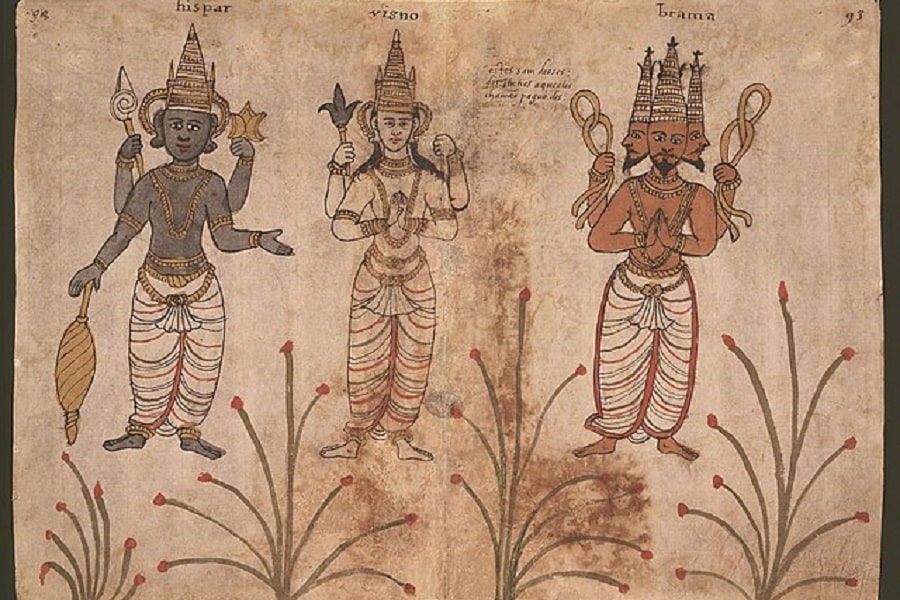
Brahma in Hindu Art and Culture
Brahma is a popular subject in Hindu art and literature. He is often depicted with four heads, representing the four Vedas or ancient Hindu scriptures. In Hindu mythology, Brahma is also associated with the swan, which is said to be his sacred vehicle.
Brahma’s role in the creation and his association with knowledge has also made him a popular figure in contemporary Hindu culture. Many Hindu schools and organizations, such as the Brahma Kumaris, are named after him and promote spiritual growth through meditation and self-realization.
Brahma in Comparative Religion
Brahma’s role as the creator god of Hinduism has drawn comparisons with other creator deities in world religions. For example, in the Judeo-Christian tradition, God is seen as the creator of the universe, while in ancient Egyptian religion, the god Atum was the creator of the world. Brahma’s association with knowledge and wisdom has also drawn comparisons with other figures in world religions, such as the Greek god Apollo and Minerva, the Roman goddess of wisdom and justice.
READ MORE: 35 Ancient Egyptian Gods and Goddesses
Overall, Brahma’s continued relevance in contemporary Hinduism highlights the enduring nature of Hindu mythology and culture. His role as the creator god and his association with knowledge and spirituality make him an important figure for many Hindu devotees, and his influence can be seen in Hindu worship, art, and literature.
READ MORE: 41 Greek Gods and Goddesses: Family Tree and Fun Facts
Brahma and the Four Vedas
Brahma, the creator god in Hindu mythology, is closely associated with the four Vedas – the Rigveda, Yajurveda, Samaveda, and Atharvaveda. These ancient texts are considered the foundation of Hinduism and Brahma is credited with their creation. The Vedas are a collection of hymns, mantras, and rituals that were transmitted orally for generations before being written down.
The Rigveda is the oldest and most important of the four Vedas and is said to have been composed in the northwestern region of the Indian subcontinent around 1500 BCE. It contains hymns dedicated to various deities, including Brahma. The Yajurveda contains instructions for performing yajnas or sacrificial rituals, while the Samaveda contains melodies and chants that were used in these rituals. The Atharvaveda is a collection of hymns, spells, and incantations that were used for various purposes such as healing and protection.
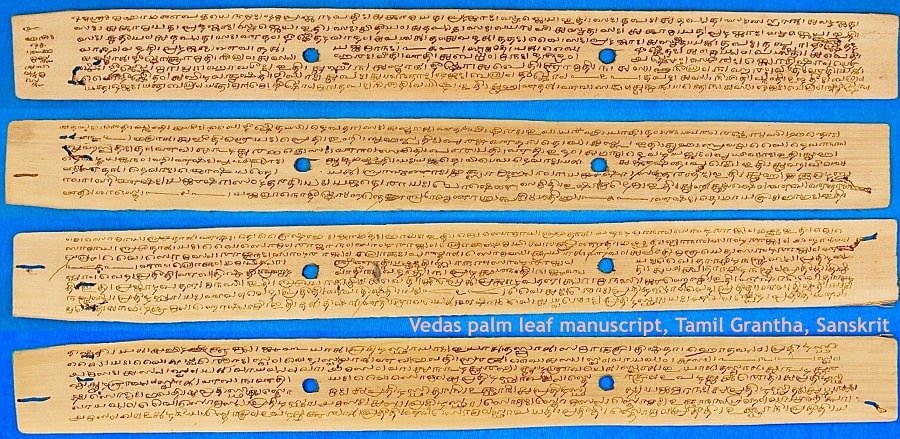
READ MORE: Ancient Civilizations Timeline: The Complete List from Aboriginals to Incans
Brahma is considered the patron of the Vedas and is often depicted holding a copy of one of the texts. He is believed to have created the Vedas through his divine inspiration and imparted them to the sages who passed them on to subsequent generations. In Hindu mythology, Brahma is also known as Vedanatha or lord of the Vedas.
The Vedas have played a crucial role in the development of Hinduism and continue to be studied and revered by Hindus around the world. They provide a glimpse into the religious practices and beliefs of ancient India and have influenced many aspects of Hindu culture, including music, dance, and art. The connection between Brahma and the Vedas underscores the importance of knowledge and wisdom in Hinduism and highlights the role of the creator god in shaping the religion.
Significance of Brahma in Hinduism
Brahma is a complex and multifaceted deity, and his significance in Hinduism cannot be understated. His importance extends beyond mythology and into Hindu culture. He is often depicted in art, literature, and music, and his image is an important part of Hindu iconography.
In addition, Brahma’s role as the creator deity has shaped Hindu beliefs about the nature of existence and the universe, and his teachings about dharma (righteousness) and karma (action) have influenced Hindu philosophy and ethics.
Conclusion
Brahma is a complex and multi-faceted deity with a rich history and tradition in Hinduism. Throughout the ages, Brahma has been revered as the creator of the universe, the god of knowledge, and the patron of priests and scholars. Despite his prominent role in Hinduism, Brahma is often overshadowed by other gods like Vishnu and Shiva. However, his influence can still be felt in the rituals and practices of Hinduism today.
By exploring the many facets of Brahma, we gain a greater understanding and appreciation for the diversity and complexity of Hinduism as a religion and culture. Whether viewed as a cosmic creator or a symbol of knowledge and wisdom, Brahma remains an important figure in Hinduism and an embodiment of its rich spiritual heritage.